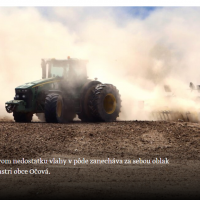The impact of climate change in southern Slovakia is already very noticeable today. Increased temperature and lack of rainfall affect not only farmers but also the surrounding nature.
In Slovakia, the average annual temperature has risen by more than 1 ° C over the last 100 years. The warmest 12 years have been recorded since the early 1990s. At the same time, precipitation decreased by an average of 5.6%, while in the south of Slovakia by up to 10%. The decrease in precipitation together with the increase in temperature disrupts the natural water cycle and reduces the groundwater supply.
This map compares the current drought with the same period over the last 50 years. The red one is literally menacing. Two thirds of Slovakia suffers from extreme drought.
How to increase the country’s resilience to the effects of climate change
Climate change is already having a significant negative impact on the region of southern Slovakia. Water scarcity, weather fluctuations, torrential rains and long periods of drought have critical consequences for agriculture. The ongoing climate change is putting pressure on farmers – for irrigation and chemicalization, which in turn puts even more strain on the nature of southern Slovakia.

It is therefore essential that we increase demand and support for nature-friendly farming and prepare the country and ourselves for the forthcoming climate change. Increasing the resilience of the landscape can be achieved by returning nature to it and leaving enough space for natural processes to take place undisturbed.
As part of the LIFE Ostrové Lúky project, we are implementing pilot nature restoration projects in an intensive agricultural landscape – we are restoring wetlands, planting tree lines and restoring pastures. We work with mayors to restore nature in their villages and support local farmers who are interested in nature-friendly farming.
These are the first small steps in this area, but they are of great importance for nature. Wetlands and meadows also help combat climate change by absorbing CO2 from the atmosphere.
We hope that taking into account the needs and limits of nature will soon be incorporated into agricultural legislation and farming close to nature will become the standard in Slovakia.



